Defenses for Spring 2019
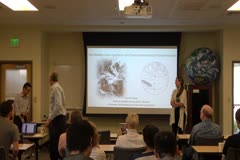
THE MADDEN JULIAN OSCILLATION AND TROPICAL-EXTRATROPICAL TELECONNECTIONS
June 24, 2019
Kai-Chih Tseng
The Madden Julian Oscillation (MJO) excites strong variations in extratropical circulations that have important implications for subseasonal-to-seasonal (S2S) prediction. In particular, certain MJO phases are characterized by a consistent modulation of geopotential height patterns in the North Pacific and North America. Although the MJO's influence in the downstream weather has been widely…
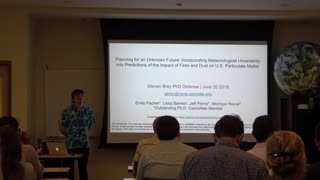
Planning for an Unknown Future: Incorporating Meteorological Uncertainty into Predictions of the Impact of Fires and Dust on US Particulate Matter
June 20, 2019
Steven Brey
Exposure to particulate matter (PM) pollution has well documented health impacts and is regulated by the United States (U.S.) Environmental Protection Agency (EPA). In the U.S. wildfire smoke and wind-blown dust are significant natural sources of PM pollution. This dissertation shows how the environmental conditions that drive wildfires and wind-blown dust are likely to change in the future and…
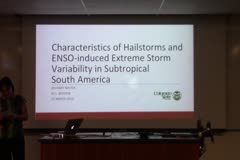
CHARACTERISTICS OF HAILSTORMS AND ENSO-INDUCED EXTREME STORM VARIABILITY IN SUBTROPICAL SOUTH AMERICA
March 25, 2019
Zachary Bruick
Convection in subtropical South America is known to be among the strongest anywhere in the world. Severe weather produced from these storms, including hail, strong winds, tornadoes, and flash flooding, causes significant damages to property and agriculture within the region. These insights are only due to the novel observations produced by the Tropical Rainfall Measuring Mission (TRMM)…

APPROACHING ARCTIC-MIDLATITUDE DYNAMICS FROM A TWO-WAY FEEDBACK PERSPECTIVE
March 15, 2019
Marie McGraw
Arctic variability and the variability of the midlatitude circulation are closely intertwined. Although these connections are interrelated and bi-directional, and occur on a variety of timescales, they are not often studied together. Modeling studies generally focus on a single direction of influence--usually, how the midlatitude circulation responds to the Arctic. Studying these…
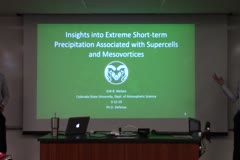
INSIGHTS INTO EXTREME SHORT-TERM PRECIPITATION ASSOCIATED WITH SUPERCELLS AND MESOVORTICES
March 12, 2019
Erik Nielsen
Overall, this manuscript aims to holistically evaluate the relationship between rotation and extreme precipitation processes, since radar and rain gauge observations in several flash flooding events have suggested that the heaviest short-term rainfall accumulations were associated with supercells or mesovortices embedded within larger convective systems. A specific subclass of these events,…
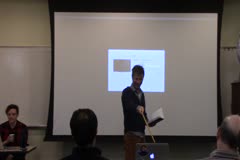
Connections between climate sensitivity and large-scale extratropical dynamics
February 14, 2019
Luke Davis
The response of the extratropical storm tracks to anthropogenic forcing is one of the most important but poorly understood aspects of climate change. The direct, thermodynamic effects of climate change are relatively well understood, but their two-way interactions with large-scale extratropical dynamics are extremely difficult to predict. There is thus continued need for a robust understanding…
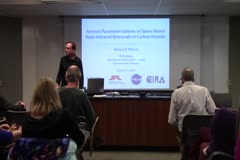
Aerosol Parameterizations in Space-Based Near-Infrared Retrievals of Carbon Dioxide
January 14, 2019
Robert Nelson
The scattering effects of clouds and aerosols are one of the primary sources of error when making space-based measurements of carbon dioxide. This work describes multiple investigations into optimizing how aerosols are parameterized in retrievals of the column-averaged dry-air mole fraction of carbon dioxide (XCO2) performed on near-infrared measurements of reflected sunlight from the Orbiting…
